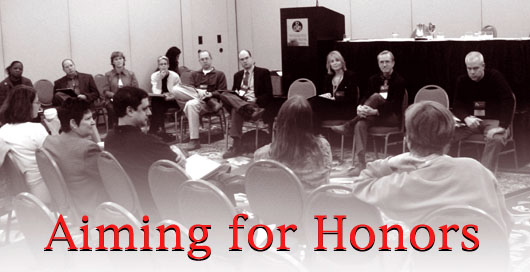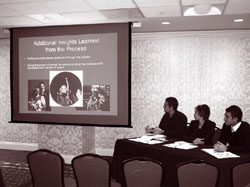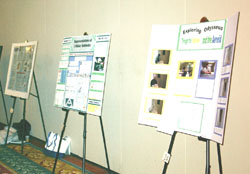
A Harvard-quality education at a public university? A chance to really shine at your local community college? If your student is intellectually inclined & enjoys a challenge, read on.
What do you do when the yearly National Collegiate Honors Council conference comes to your home town?
If you're the publisher of Practical Homeschooling, you arrange for a press pass, grab a couple of staff members with cameras, and head right there!
It turns out that Practical Homeschooling is the first publication ever to request a press pass to an NCHC conference. I found that hard to believe. What has The Chronicle of Higher Education been thinking all these years?
Not only was the October 26-30 conference in St. Louis a lot of fun, it opened our eyes to a whole new area of college opportunity that homeschool parents and teens should seriously consider.
At the Conference
I really needed to bring about 20 people along to have a hope of seeing all there was to see at the conference. Skipping the Wednesday meetings, which were clearly for NCHC business, we started off Thursday morning with the "Beginning in Honors" workshop. This was meant as an introduction to schools thinking of starting an honors program, but also made a fine place for us to get oriented. The first thing we noticed was that the chairs had been carefully rearranged in a circle. According to Princeton sociologist Mitchell Stevens, author of the book Kingdom of Children, this displays a desire for group democracy rather than leadership-a telltale sign of liberal tendencies. However, the educators actually leading the workshop positioned themselves at the top of the room facing everyone else, which is a telltale sign of conservative tendencies. We took this as a good sign that in fact everyone was welcome, whether liberal or conservative.
After listening for a while to the leaders speak and others ask questions and express views, mostly related to technical aspects of setting up and running an honors program, we split up to attend a couple of the dozens of breakout sessions. These covered topics from the effects of AP and dual enrollment on honors, to service learning, fundraising, selecting and mentoring honors faculty, and much more. We then had to head back to home base, missing the Master Classes, mini institute on scholarship preparation (for advisors), reception, silent auction, meet and greet, student party, and lots more.

Honors students led their own workshops, as in this presentation by three Oklahoma City University students on "Oral History Research as a Gateway to Undergraduate Scholarship." |
The information overload continued on Friday, as we made our way to several of over 100 "presentation sessions." Here mostly students, plus a scattering of faculty, gave short presentations on a staggering number of topics, again covering many unusual aspects of honors (e.g., "Wanderlust: The Honors Student Abroad" and "Exploring Music Students' Perspectives on Honors Contract Projects"), plus lots of odd-sounding titles that turned out to be presentations of students' own honors projects.
Then it was on to our first "Poster Session." Picture a science fair without the experiments or the prizes. Dotted around the edges of the room are easels with posters on them. Hovering near each poster is one or more honors student, anxious to discuss the project the poster summarizes, provided you can hear them over the noise of all the other honors students discussing their posters.
The "City as Text" activity allowed students to roam around St. Louis in teams. This was not supposed to be just plain tourist fun, though-each team had an assignment booklet to fill out with observations and maps they created. Kudos to the honors folks for realizing the real world is an educational resource, just as homeschoolers have been saying for years.

A poster session is like a science fair without the experiments... |
Another highlight was meeting Dr. Joan Digby, a past president of NCHC and the author of the book on honors colleges and programs. See its review in the yellow box on this page.
So, What Is Honors?
As Dr. Peter C. Sederberg says in his article "Honors Programs and Honors Colleges: What's the Difference?" (found in the Peterson's Smart Choices book):
Honors Programs have been around for decades. The Honors phenomenon really took off with the upsurge in demand for higher education after World War II. Elite private schools could not accommodate this demand nor could most students afford that path. Public higher education responded and, with the burgeoning growth in their student populations, began to experiment with enriched opportunities for their pool of talented students. Private schools below the "top tier" also responded by creating such opportunities... Honors Colleges, however, are a much more recent trend... 60 percent of the Honors Colleges responding [to a recent survey] have been established since 1994, and 80 percent grew out of a preexisting Honors program.
An honors program usually consists of either "honors" substitutions for "general education" core courses or special sections of these courses. In addition, after the student has completed the core requirements, there may be additional honors courses. These are often called "colloquia" or "seminars." Field trips with the class, and even study outside the USA, are not uncommon, as is participation in national and regional honors conferences such as the one we attended. The school often pays expenses for such travel. The school may also provide special scholarships for its undergraduate honors students. Finally, the honors student may complete a "capstone" project or thesis.
Undergraduate research is stressed in honors programs. Class sizes are also smaller, faculty typically is of a higher caliber and spends more time with the students, and there is much more class discussion. Expect lots of writing and speech requirements, especially the need to present papers.
All of this makes a great preparation for graduate school, and this is where honors might shine the most. Honors students typically get special advisors who help them prepare to apply for graduate scholarships and fellowships, and help them with their applications.
In addition, the student's diploma and transcripts typically carry some indication of their "honors" status and achievements. They may be specially singled out at graduation as well.
What Colleges Offer Honors?
In 1966, honors educators came together to form the National Collegiate Honors Council, which has since then carried the banner for American honors education at the college level.
Today, the NCHC website lists 714 two- and four-year colleges as members, from Abilene Christian University to Youngstown State University.
Who you won't find on that list: Harvard or Yale or for that matter first-rank engineering colleges such as M.I.T., R.P.I., Rice, or Carnegie-Mellon, or any of the University of California campuses.
Why? The Ivies are (or think they are) honors colleges already. Engineering schools are less interested in humanities, where honors has always had its strongest presence in the past, although a few smaller engineering schools (e.g., University of Missouri-Rolla) do now have fledgling honors programs. And UC officials have not exactly been thinking clearly about admissions issues related to merit for years.
But with those exceptions, more and more colleges and universities are signing on to the "honors" model. For your student, it could be a gateway to an Ivy education at a super low price. So keep honors in mind as you work through your college plans!